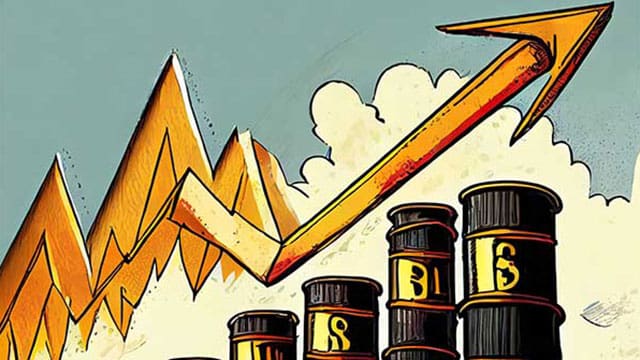The facts support his confidence on oil prices. And that is not good news for the green lobby
 Oil forecasts are notoriously tricky to make. Yet the OECD energy watchdog, the International Energy Agency (IEA), the Organization of Petroleum Exporting Countries and its allies in the OPEC+ continue to emphasize their respective, contradictory reading of the oil market sentiments.
Oil forecasts are notoriously tricky to make. Yet the OECD energy watchdog, the International Energy Agency (IEA), the Organization of Petroleum Exporting Countries and its allies in the OPEC+ continue to emphasize their respective, contradictory reading of the oil market sentiments.
Despite strong refutation by the IEA and the weakening of crude markets in recent weeks, Saudi Arabia, the OPEC kingpin, continues to be convinced that global crude demand is projected to go up, not down, in the foreseeable future.
Oil demand is healthy, and speculators are to blame for the recent drop in crude prices, Bloomberg quoted Saudi energy minister Prince Abdulaziz bin Salman as saying. “It’s not weak,” he told reporters in Riyadh when asked about the decline in oil prices. “People are pretending it’s weak. It’s all a ploy.”
That was a strong rebuke to the IEA.
The minister explained that some individuals in the oil market have misinterpreted the recent growth in oil exports from Arab nations within OPEC and their connection to these countries’ production levels. He clarified that these shipments follow a seasonal pattern, typically decreasing during the summer and rebounding in September and October. As a result, they should not be seen as indicative of output fluctuations.
“It’s an abuse of numbers” to fail to distinguish between rising exports and rising production, said Prince Abdulaziz.
Despite the odds, and indeed with some strong reasoning, Saudi Arabia and other OPEC+ member states continue to bet on rising global demand for fossil fuel. OPEC sees oil demand growth continuing until at least 2045. It has thus been lashing out at the IEA’s projections of an imminent end to oil and gas demand growth. OPEC insists that “such narratives only set the global energy system up to fail spectacularly. It would lead to energy chaos on a potentially unprecedented scale, with dire consequences for economies and billions of people across the world.” Even amid an energy transition, hydrocarbons and petrochemicals will be required, OPEC continues to highlight. OPEC has a point.
One needs to look at the slumping oil price in the last couple of weeks from a little different perspective. Irina Slav wrote in her Oilprice.com piece that the latest price decline is occurring amid weakening doubts about Middle East supply disruption because of the Israel war with Hamas. Initially, the so-called war premium added a few dollars to the benchmarks, but as time passed and no disruption occurred, that premium began to run out of steam.
Slav also highlights the markets’ fixation with Chinese economic data, reporting a contraction in exports in October. The data made traders think China is slowing down. But there was also a simultaneous increase in oil imports.
And despite all the negative data on the health of Chinese industrial output, last Tuesday the International Monetary Fund upgraded China’s economic growth outlook for both this year and the next. The IMF now expects China’s GDP to grow by 5.4 percent, up from five percent in previous forecasts.
When it comes to demand for oil in the West, the European Union recently held an emergency meeting to discuss the unenviable state of its fuel inventories and the possibility of setting up something like a strategic reserve for diesel. This does not exactly suggest a lower demand for oil and its products but rather a lower-than-desired supply, Slav argued.
At the same time, however, OPEC exports are rising, which has pressured prices. “OPEC crude exports are up by about one million barrels per day (bpd) since their August low. This was apparently because of seasonally lower domestic demand in the Middle East. It seems it is too much supply to be absorbed by oil-consuming nations,” UBS analyst Giovanni Staunovo told Reuters. This, too, is impacting the markets.
Further, despite the emphasis by the IEA on the growing number of EVs on the street, impacting global oil consumption, it is now being reported that the makers of these EVs are not exactly optimistic about their electric bet. Lower than expected demand is plaguing the industry, and so are various challenges ranging from higher insurance premiums to insufficient chargers to weather-dependent performance, Slav reports.
Prince Abdulaziz bin Salman is not naïve. He and his bunch of experts keep a very close eye on the markets – but through a prism – different than that of the IEA. One cannot honestly write off their reasoning. After all, Saudi Arabia would not invest in increasing its output capacity without solid reasoning.
For a change, let’s put Prince Abdulaziz’s prism on. And this is not good news for the green lobby.
Toronto-based Rashid Husain Syed is a highly-regarded analyst specializing in energy and politics, with a particular emphasis on the Middle East. Besides his contributions to both local and international newspapers, Rashid frequently lends his expertise as a speaker at global conferences. His insights on global energy matters have been sought after by organizations such as the Department of Energy in Washington and the International Energy Agency in Paris.
For interview requests, click here.
The opinions expressed by our columnists and contributors are theirs alone and do not inherently or expressly reflect the views of our publication.
© Troy Media
Troy Media is an editorial content provider to media outlets and its own hosted community news outlets across Canada.

